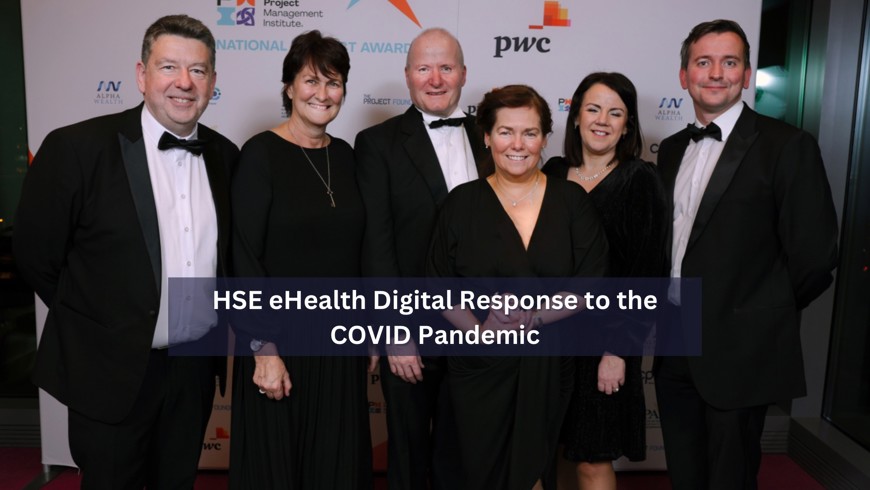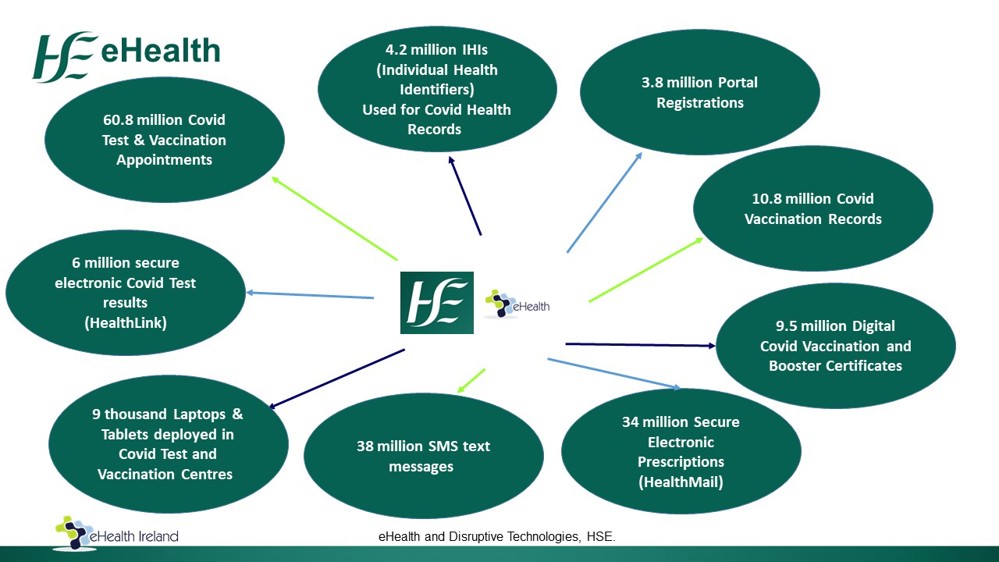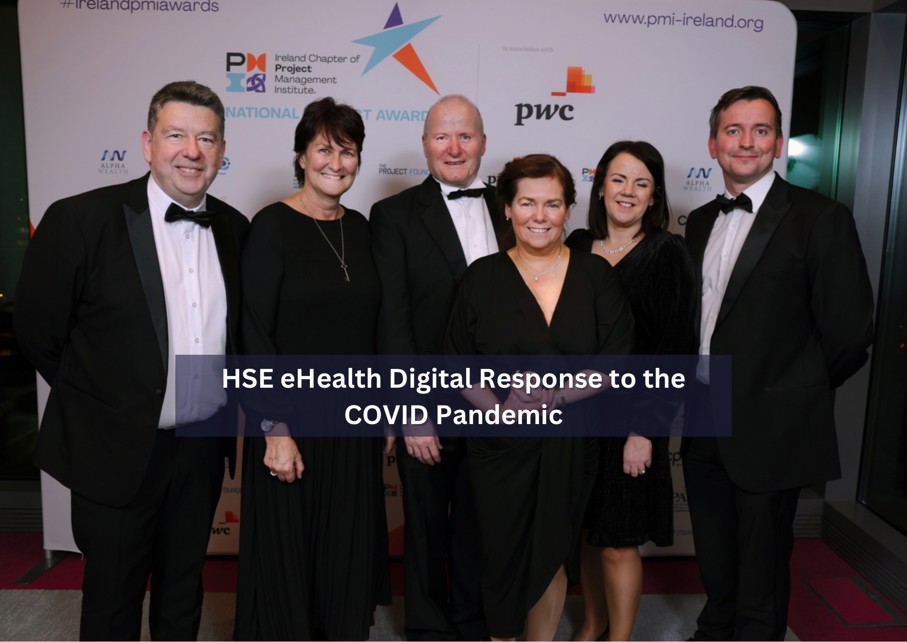
PMI Ireland National Project Awards
eHealth were recently short-listed by the PMI Ireland National Project Awards as 2 of the 5 programme finalists in the special category of Greatest National Impact Project for our role in both “The HSE’s eHealth Digital Response to the COVID Pandemic” and “The HSE’s Covid Vaccination Programme”.
The PMI awards celebrate outstanding success in project management; recognising individuals, projects, teams and organisations that have demonstrated excellence in the delivery of change and every division of eHealth and there was not a member of the eHealth team that did not play a role in the HSE’s Digital response to Covid.
The operational response to Covid was so time critical that it quite simply could not have been achieved without the digital systems that were put in place and the capture of accurate and timely data and information required for the government and the HSE to make the decisions needed to protect the public and health services.
There were multiple technical systems, applications and devices that were rapidly deployed and securely integrated on the HSE’s network infrastructure to provide registration portals, identification services, tracking systems for Covid Testing, Contact Tracing and Vaccinations, appointment scheduling, telehealth services, SMS text message communications and secure electronic messaging and electronic prescribing. Furthermore, the digitisation of information provided by these systems allowed eHealth to provide timely data analytics and the health intelligence data required to enable public health services to track the disease and operationally respond to demands for Covid testing and vaccinations.
The table below provides an indication of the scale of delivery by the eHealth teams across the Covid Response pathway:

It is testimony to the quality of the systems that were delivered that these systems, while rapidly deployed, have remained secure and available on a 24 hours basis, 7 days a week since the onset of Covid and were not impacted by the Cyber event in May 2021.
The award was ultimately decided by public vote with the award going to the HSEs Covid Vaccination Programme resonating the most - all made possible by eHealth with the case outlined citing how the vaccine registration portals using the Individual Health Identifier (IHI) used to create creating Covid vaccination records ,for all those who received a vaccine which in turn lead generating to Digital Covid Vaccination Certificates allowing citizens to travel and dine out as restrictions eased.
There was not a member of the nation’s population, citizen, patient, carer, clinician or health worker, that did not benefit from the availability of the vaccination, contact testing and tracing systems, devices and data intelligence delivered by eHealth.
While it has been a very challenging 3 years now for eHealth, it has been so rewarding for us to have had the opportunity to demonstrate what technology can do and how it can transform the way our health workers can efficiently deliver Health Services. All that we have done has made an impact for our colleagues in the HSE, the wider public service, our clinicians our front line health workers and indeed the wider population of Ireland.
We are immensely proud of all of the entire eHealth team, for their skills and work ethic displayed during such a challenging time and are delighted to have it recognised not only on such a prestigious platform as the PMI awards but most of all, by members of the public, our own families and friends.

Pictured above from the Awards Night, L to R: Steve Jones (from the A2IHIDs (Health Identifier Team); Helen Coughlan (eHealth CTO); Fergus Murray (eHealth-A2IHIDs (Vaccination Integration); Roisin Doherty (Director A2IHIDs); Bernie Flynn (eHealth-Public Health (Covax); and Mark Bagnell (eHealth IIS).
Appendix: HSE eHealth Covid technical solutions.
This programme of work delivered by the HSE eHealth team encompassed the delivery of multiple technical solutions to support the protection of our population from the Covid Pandemic. The range of technical solutions included portals, applications, telehealth services and health intelligence data all of which contributed to the protection of citizens and health care workers, while enabling public health services to track the disease and respond to demands for Covid testing, contact tracing and vaccinations.
It started with the rapid delivery of an integrated Covid Testing and Contact Tracing system to allow doctors refer their patients for Covid Test Appointments with access to electronic Covid test results within 12 hours. These results could be communicated back to the Citizen and their clinicians. In the case of positive Covid test results, public health services were able to identify cases and use contact tracing to inform citizens and their close contacts of the need to isolate in order to protect their families and the wider population.
Within 3 weeks of confirming that the Covid Vaccines would be available, portals were deployed to allow Citizens and Health Workers register themselves for and schedule their vaccination appointments. The individual health identifier (IHI) was used to create a Covid Vaccination record for all those who received a vaccine. These systems were later used to provide Digital Covid Vaccination Certificates, allowing Citizens to dine in restaurants as restrictions eased and international travel resumed.
While the general public would have had sight and interaction directly with these eHealth systems, the same systems were also required to support the vulnerable among us for Covid testing and vaccine administration to the house bound and those in residential care facilities such as nursing homes and for their health care workers.
Technical solutions were also put in place to protect the public, patients and health workers by the provision of telehealth consultation facilities and ePrescribing, minimising the requirement for patients to visit health care facilities with additional solutions deployed to help protect health workers and the general public such as telehealth solutions, accommodation for health workers who needed to isolate, electronic prescribing and the Covid Tracking App.
The data and information insights captured by these systems allowed public health services to track the trajectory of the disease and outbreaks. It also enabled the HSE to identify where the demands for testing and vaccinations were greatest, indicating where to locate Covid Test and Vaccination centres in close proximity to large volumes of demand for Covid services.
There were multiple types of technical systems, applications and devices that needed to be rapidly deployed and integrated on the HSE’s network infrastructure to provide registration portals, identification services, tracking systems for Covid Testing, Contact Tracing and Vaccinations, appointment scheduling, SMS text message communications, secure electronic messaging and data analytics.
Underpinning all these systems was the necessity to ensure that all personal data was secure and that the systems were operational 24 hours a day with the capability to perform and cope with large volumes and surges of requests and to turn around responses in some cases within minutes for e.g. SMS communications with members of the public.
It is testimony to the quality of the systems that were delivered that these systems, while rapidly deployed, have remained secure and available on a 24 hours basis, 7 days a week since the onset of Covid and were not impacted by the Cyber event in May 2021.
The operational response to Covid was so time critical that it quite simply could not have been achieved without the digital systems that were put in place and the capture of accurate and timely data and information required for the government and the HSE to make the decisions needed to protect the public and health services.
There was not a member of the nation’s population that did not benefit from the availability of these systems and the data captured be they a citizen, patient, carer, clinician or health worker.
Read more about this team and the work they do here.
